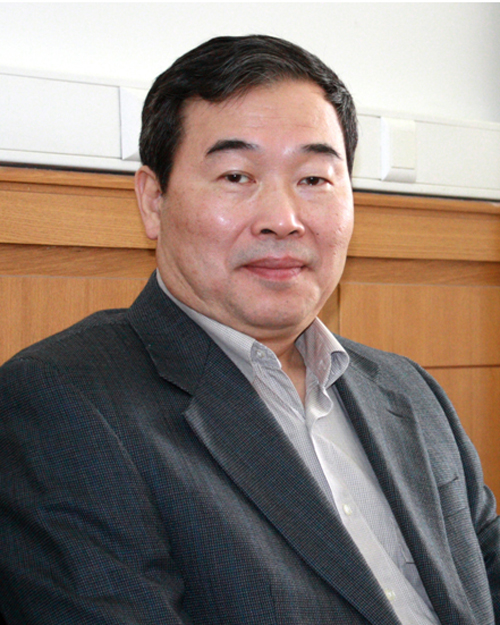
Mu‐Ming Poo, PhD, a world‐renowned researcher whose innovative work has helped unravel some of the most important mysteries in cellular neuroscience, is the recipient of the 2016 Gruber Neuroscience Prize. Poo, who is currently the Paul Licht Distinguished Professor in Biology Emeritus at the University of California, Berkeley, and the director of the Institute of Neuroscience (ION) at the Chinese Academy of Sciences in Shanghai, is being honored with this prestigious international award for his seminal discoveries regarding the molecular and cell mechanisms underlying synaptic plasticity in the brain.
The award will be presented to Poo, 68, in San Diego on Nov. 13 at the 46th annual meeting of the Society for Neuroscience.
“Through his innovative and ingenious experiments, Mu‐Ming Poo has greatly advanced knowledge of mechanisms of brain plasticity‐ the ability to form new connections or change the strength of existing ones driven by our experiences of the world‐ in nerve cells,” says Dr. Carla Shatz, Bio‐X, Stanford University “He has enhanced our understanding of how synapses, the special junctions between nerve cells so crucial for all brain functions, are reinforced or weakened by neural activity.” 
Prof. Mu‐Ming Poo
(Photo provided by ION)
Throughout his long career, Poo’s research approach has been unusually broad and inventive. In addition to his discoveries regarding synaptic plasticity, he has made major contributions in several other research areas, including neuronal polarization, the maturation of the neuromuscular junction, the molecular and cell mechanisms underlying axon guidance, and the neurotrophic regulation of synaptic functions. He has opened many new research avenues that have shaped entire fields. These include the use of nerve‐muscle cultures to study synaptic plasticity in vitro, the discovery that the level of cyclic nucleotides can reverse the polarity of nerve pathfinding decisions, and the appreciation that synaptic plasticity often affects remote synapses.
In addition, Poo has an outstanding record of service to the international research community. Since 1999, he has almost single‐handedly transformed the ION into a world‐class neuroscience research institute.
“He is an extraordinarily dedicated scientist,” says Dr. Robert Wurtz, chair of the Selection Advisory Board to the Prize. “The breadth of his impact on neuroscience has been exceptional, and he is much deserving of this award.”
Additional Information
In addition to the cash award, the recipient will receive a gold laureate pin and a citation that reads:
The Gruber Foundation proudly presents the 2016 Neuroscience Prize to Mu‐Ming Poo for his pioneering and inspiring work on synaptic plasticity.
Mu‐Ming Poo has used both in vitro and in vivo neuronal systems to discover the fundamental and quantitative determinants that influence neuronal growth and synaptic strength. He defined the temporal parameters, for example, that strengthen and weaken synapses during spike timing‐dependent plasticity. He also demonstrated how the concentration of intracellular signals determines the growth choices that neurons make.
Through his many ingenious experiments he has addressed and elucidated the fundamental logic and rules governing synaptic plasticity and has consistently evoked the admiration of his colleagues with his creative approach to Neuroscience.
………………………………………………………………………………………...................................................................
Laureates of the Gruber Neuroscience Prize:
2015: Carla Shatz and Michael Greenberg, for their elucidation of the molecular mechanisms through which neural activity controls wiring and plasticity of the brain
2014: Thomas Jessell, for his pioneering work on the differentiation of spinal cord neurons and their wiring into networks
2013: Eve Marder, for her contributions to understanding how circuit dynamics and behavior arise from the properties of component neurons and their synaptic connections
2012: Lily and Yuh Nung Jan, for their fundamental contributions to molecular neurobiology
2011: Huda Y. Zoghbi, for her pioneering work on revealing the genetic underpinnings of neurological disorders
2010: Robert H. Wurtz, for pioneering work concerning the neural bases of visual processing in primates
2009: Jeffrey C. Hall, Michael Rosbash, and Michael Young, for revealing the gene‐driven mechanism that controls rhythm in the nervous system
2008: John O’Keefe, for discovering place cells, which led to important findings in cognitive neuroscience
2007: Shigetada Nakanishi, for pioneering research into communication between nerve cells in the brain
2006: Masao Ito and Roger Nicoll, for work on the molecular and cellular bases of memory and learning
2005: Masakazu Konishi and Eric Knudsen, for work on the neural basis of sound localization
2004: Seymour Benzer, for applying the tools of molecular biology and genetics to the fruit fly, Drosophila, and linking individual genes to their behavioral phenotypes
The Prize recipients are chosen by the Neuroscience Selection Advisory Board. Its members are:
Susan Amara, NIH/NIMH; Tobias Bonhoeffer, Max Planck Institute for Neurobiology; Martin Chalfie, Columbia University; Frances Jensen, University of Pennsylvania; Tirin Moore, Stanford University; Erin Schuman, Max‐Planck Institute; and Robert Wurtz, National Institutes of Health (Chair).
.........................................................................................................................................................................................
By agreement made in the spring of 2011 The Gruber Foundation has now been established at Yale University.
The Gruber International Prize Program honors individuals in the fields of Cosmology, Genetics and Neuroscience, whose groundbreaking work provides new models that inspire and enable fundamental shifts in knowledge and culture. The Selection Advisory Boards choose individuals whose contributions in their respective fields advance our knowledge and potentially have a profound impact on our lives.
The Neuroscience Prize honors scientists for major discoveries that have advanced the understanding of the nervous system
..........................................................................................................................................................................................
For more information on the Gruber Prizes, visit www.gruber.yale.edu, e‐mail info@gruber.yale.edu or contact A. Sarah Hreha at +1 (203) 432‐6231. By mail: The Gruber Foundation, Yale University, Office of Development, PO Box 2038, New Haven, CT 06521.
Media materials and additional background information on the Gruber Prizes can be found at our online newsroom: www.gruber.yale.edu/news‐media.
(The Gruber Foundation)
86-10-68597521 (day)
86-10-68597289 (night)

86-10-68511095 (day)
86-10-68512458 (night)

cas_en@cas.cn

52 Sanlihe Rd., Xicheng District,
Beijing, China (100864)

